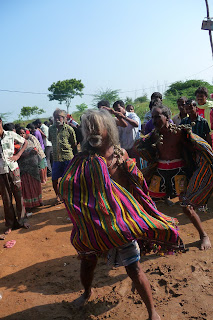 Blimey! I have just been to a religious festival whereby the Narikuravars form Devarayaneri and surrounding communities came together to praise their God - Kalhi. The focus of the event is the sacrfice to Kali which this year meant that four goats and three bulls were to be killed/murdered/offered/sacrificed, depending on how you want to view this. For me, I struggled to get to grips with the occasion and found it difficult to throw away my cultural goggles to try and understand this tradition free from my own views, perceptions and understandings. I found that I couldn't do this and that the beatings which the bulls received were unjust, cowardly and made me want to hit people! I actually became ashamed that I was just observing and not trying to stop it but gained confidence from one man who was persuading a group of young men not to hit one bull, he was comforting the bull by stoking its head. The young men went off to
Blimey! I have just been to a religious festival whereby the Narikuravars form Devarayaneri and surrounding communities came together to praise their God - Kalhi. The focus of the event is the sacrfice to Kali which this year meant that four goats and three bulls were to be killed/murdered/offered/sacrificed, depending on how you want to view this. For me, I struggled to get to grips with the occasion and found it difficult to throw away my cultural goggles to try and understand this tradition free from my own views, perceptions and understandings. I found that I couldn't do this and that the beatings which the bulls received were unjust, cowardly and made me want to hit people! I actually became ashamed that I was just observing and not trying to stop it but gained confidence from one man who was persuading a group of young men not to hit one bull, he was comforting the bull by stoking its head. The young men went off to beat and pull the tale of another bull in a game of trying to knock the bull over, at which point they jump on top of it triumphantly. I failed to persuade them to stop their game and my gesture and stern expression with the word ‘NO!’ simply brought quizzical looks before they continued. I also tried getting in the way but this was no better and a friend told me the bull was fast before leading me back to an observing distance. I watched as the holy men then asked the bulls for permission to sacrifice them the next day. To do this, rope was tied around the horns before being set alight. This had the effect of causing the bull to shake its head which in Tamil Nadu is the gesture for ‘yes’, contrary to British gestural norms which would mean ‘no’. This subtle difference has caused me confusion in everyday conversations and when asking for directions!
By the end of the evening I felt that the sacrifice couldn’t come soon enough. It was really odd because being an outsider, people treated me so well and made feel very welcome. Everyone wanted to greet me, find out about me and to teach me about their traditions, religion and to share in the practices, including hitting the bulls. Since arriving at NEWS, I have always found this with the Narikuravars who have always been so welcoming to myself, Sharon and Melody. The lack of respect for the animals I found contrary to my upbringing and social identity and therefore difficult to accept even as the traditional practice of a completely different culture.
The sacrifice of the bulls and goats came the morning after. This at least seemed to have more purpose - families feast on the meat as well as the animals being an offering to God. Also, perhaps the main purpose of the sacrifice, is to allow everyone to see which section of the Nariukuravar community you belong to. As a Narikuravar family you either eat the beef or the goat. In choosing a partner, males and females will choose someone from the other half of the community so as to avoid marrying a family member. Everyone will therefore pay attention to who is eating what. The vibe was excitement in the morning and community members and families worked together during the final preparations, killings and meal prep. It is a time when all families forget their differences and unite as a community.
The most surreal part of the event was watching the holy families undertake practices which go back for centuries. One of their duties, as well as helping everyone to receive a blessing, is to channel their God through their bodies to enable him to accept the offering. Whilst the animal is killed, they seemed to dance in a possessed, trance-like and energetic manner before drinking the blood which drains from the animal’s neck.
I was warned by our development worker colleague Tintu that the event would be unpleasant at parts and would risk me loosing respect for the Narikuravars. In some ways she’s right, I find it difficult to respect anyone who treats animals in such a manner. However, I also gained respect in other areas such as being impressed by the hospitability. I must also thank Seetha, Mahinderin and their family who for the whole time looked after me, introduced me to their friends and family and made me feel safe and secure throughout the whole weekend. I also feel privileged to have been so openly accepted at such an important community occasion and happy to have witnessed something completely different. I think that’s part of the fun of traveling and that I need to keep an open mind to new experiences, particularly as you’re never going to completely understand someone else’s motives which are fuelled by cultural, religious, societal and personal attributes.




No comments:
Post a Comment